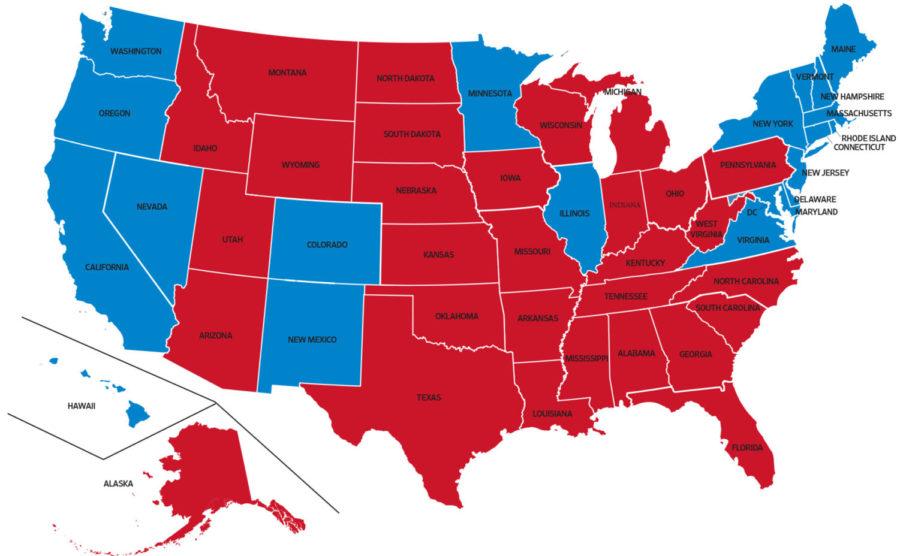Galloway: Electoral College is imperfect but most effective system
Design by Peter Lemken/Iowa State Daily
The 2016 presidential election Electoral College map.
May 20, 2019
The Electoral College was born at a Constitutional Convention during the year of 1787. Attendees of this Convention discussed ways in which a president would be elected to office. They devised a system that would give states with fewer people more sway in the presidential elections.
Having the Electoral College keeps less populous states relevant in the political sphere.
If the Electoral College didn’t exist, presidential candidates would have no reason to travel beyond the big cities while they make their rounds promoting themselves as the next president. It forces the candidate to be Nationally supported instead of dominating a few specific areas while not being supported by the rest of the country and still winning the election. An Electoral College election would make the vote of a citizen in Montana or Iowa relatively worthless.
Also, the Electoral College has a clear ending to the election. Smartasset wrote, “There’s no need for a national recount when you have an Electoral College. If one state has voting issues, you can just do a recount in that state rather than creating national upheaval”. For example, in the Bush and Gore race a recount was only necessary in the state of Florida rather than having to deal with the process of tallying up the National numbers. It took weeks to resolve the issue and it even went to the supreme court. Imagine if this was count was on a National Scale, it would increase the resolution time ten fold.
A negative of the Electoral College is that people may feel like their votes won’t make a difference especially in states where Democrats win every election. Smartasset wrote, “A Democrat in California who gets stuck in traffic and doesn’t make it to the polls probably shouldn’t beat himself or herself up”. This goes against idea that everyone has a voice and every vote is equal in a democracy.
Another issue with the Electoral College is that most of the power resides within the swing states. These are the states that receive all the attention come election day. These states don’t always represent the desires of the country as a whole.
The value of a human’s vote in Florida or Michigan is far valuable than a vote in Texas or California. The way this plays out defeats the purpose of Democracies ideology of having each vote completely equal. People will become disinterested when their vote is not valuable and may not venture out on election day to vote in the coming years.
On five occasions a president won the election but lost the popular vote. This is one of the major arguments against the Electoral College. Another argument is that the Electoral College was created to prevent uninformed and uneducated citizens from choosing the wrong candidate. This is irrelevant in the current day because the internet has unlimited information on candidates.
Although, there are certainly flaws with the Electoral College, it is hard to imagine a smooth and successful creation of an alternate voting system. Unless the Electoral College proves to have more flaws than we are currently aware of, I would propose keeping the current system.







